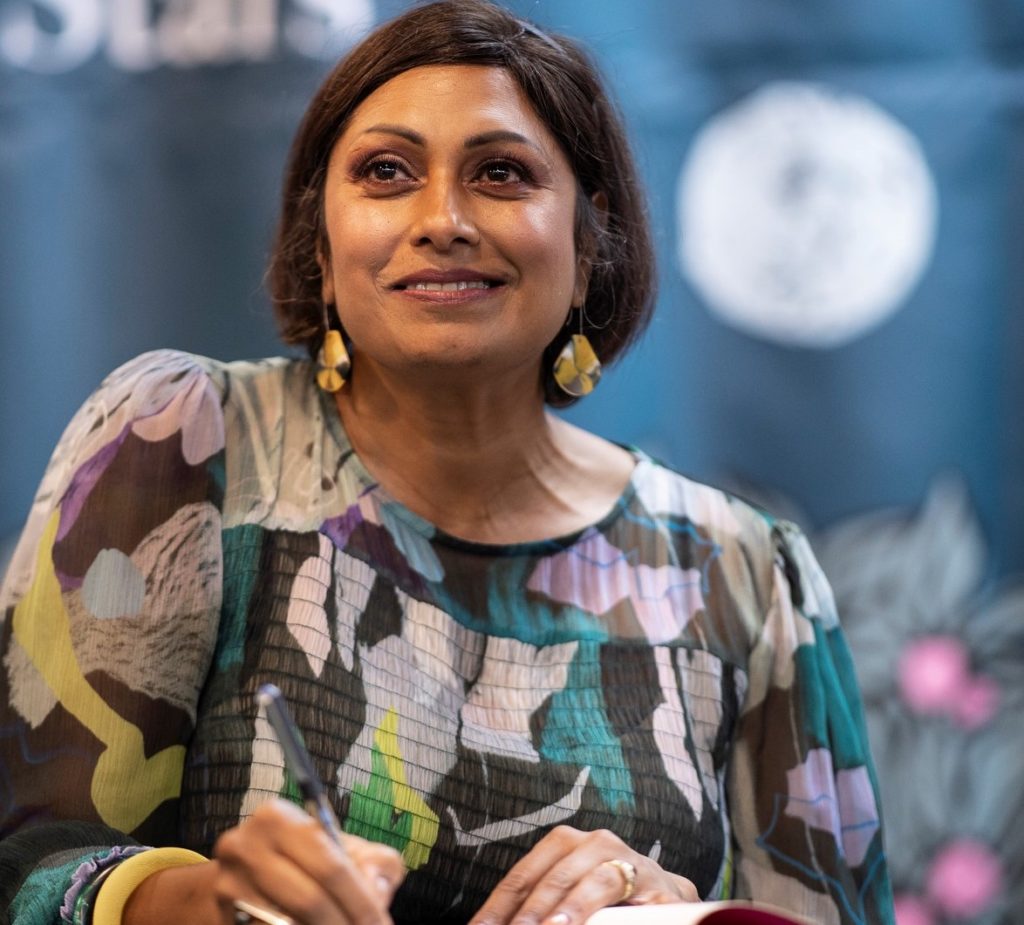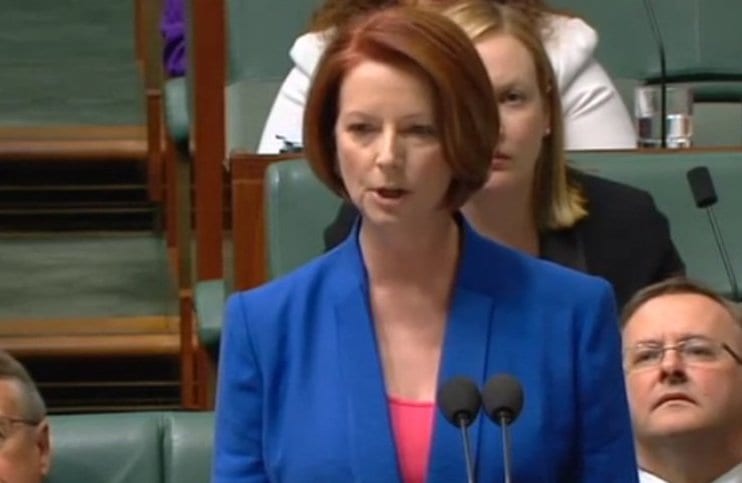Can you recall where you were, the moment you first heard then Prime Minister Julia Gillard’s misogyny speech?
Where does the memory take you back to, and can you comprehend how much has changed but also how much has stayed the same?
For journalist Indira Naidoo, she recalls being stopped immediately by the words Gillard shared in Parliament on that October day: the passion, the anger, and all the pieces that accumulated over the years prior coming together in that moment.
“It was only at that moment, where it really hit me, and I realised that this was not only the most powerful woman in the country, but the most powerful person in the country,” Naidoo says.
“And there she was at her workplace. Parliament was her workplace. She should have been safe. We all should be safe. And there were moments clearly where it hadn’t been a safe place for her to even be working in.”
That period, back in 2012, was a time when men were calling out women for taking positions of power, and calling on voters to “ditch the witch”. Women were “destroying the joint”, as Alan Jones famously declared to be the case, just weeks prior to Gillard sharing that speech. And women happily agreed with Jones’ words and took it as a call to arms, unifying together on social media and sharing their anger.
Ten years later, women are still “destroying the joint”.
And now Naidoo is preparing to interview Gillard on stage, for the live Not Now, Not Ever event, marking the anniversary and discussing how much has changed. The Melbourne event has already sold out, and demand for Sydney is equally high, with tickets selling fast for 5 October at Aware Super Theatre, ICC Sydney.

Proceeds from the two special evenings go towards supporting the Global Institute for Women’s Leadership, an organisation founded by Gillard that works to create a world where being a woman is not a barrier to becoming a leader in any field, nor a negative perception on one’s leadership.
Like Naidoo, many of us had been watching events unfold in the years leading up to the speech and wondering, just how far can this go?
“It was always going to get to a point where it was going to blow, and it just all came out in that speech,” Naidoo says.
At the time, Jane Caro predicted the speech would be “played for decades”. Catherine Fox said it’ll be remembered long after the catalyst that sparked it. Young women described how they were “prancing down the corridors with glee” whenever the video was played on the news. It was globally acclaimed as one of the best speeches of the past ten years, and was the subject of a musical re-enactment which saw Gillard becoming globally known for her work calling out sexism.
But here in Australia, the speech was also a reckoning for sexism in politics, in the media and at work. Much has changed, but then much has not, with many of the same issues Gillard was continuing to call out, continuing to hurt women every day.
It’s also hard to fully grasp just how much has occurred since Gillard’s words were shared.
We’ve had five more male prime ministers, including Kevin Rudd’s brief but second stint in the job. We saw Hillary Clinton rise to become the first US Presidential nominee, only to be devastatingly defeated by Donald Trump. There’s been the rise and fall of the MeToo movement. There have been numerous catastrophic climate-related events. And of course, the winding back of long-held — and what many thought previously unbreakable — women’s rights.
Then there’s been (and still continues) the COVID-19 pandemic.
All these local and global events drastically impact the lives of women and girls, in some cases limiting their education, career advancement and opportunities for economic security. In other ways, they impinge on their safety.

Indeed, the call to act on some of the themes and issues that Gillard raised in that speech is even stronger now, than it was back in 2012.
As Naidoo says, that speech highlighted for many of us just how parliament operates, and the toxic workplace it’d been for such a long time. We’ve further seen the depth of these issues, culminating in a high-profile sexual assault case, an apology from former Prime Minister Scott Morrison, as well as a review into parliamentary culture that’s now seen some changes introduced to create change.
But the speech was about more than parliament house then, and it’s about more than parliament house today.
It was, in many ways, about all women’s workplaces, and all the opportunities women should have free from assault, sexism and discrimination.
Naidoo shares concerns about the rights that have been wound back – not just in terms of the high profile US Supreme Court ruling overturning Roe V Wade in the United States, but also what we’ve lost with other major events, like the pandemic.
“I’m feeling wobbly in terms of what my rights are right now,” she said, particularly noting how much has shifted as a result of the pandemic.
“So many women and their jobs, and their roles. Especially vulnerable women. And we’ve seen how women are now carrying a larger part of the caring load.”
Indeed Naidoo believes a lot of women would give anything to go back ten years, especially those who feel they had more rights, freedoms and opportunities before the pandemic.
“We need to remember that women’s rights are not this one linear line.”
Indira Naidoo
“We step forward, and we roll back again. But regardless, we always need to keep the momentum going.
Keeping that momentum going will be a key topic Naidoo is set to discuss with Gillard, and to see the audience taking home and thinking about, long after they learn direct from the former prime minister about the meaning of the speech, and the impact it still has, ten years on.
“We’re now living in a changed environment, we need to remember that,” she says.
“We’ve seen the rise of the Trump era. We witnessed what [Hillary] Clinton went through. There’s been a pandemic and Black Lives Matter. It’s been a packed ten years. The agenda has moved on in so many areas, so fast. The pandemic has possibly distracted us in terms of focussing on daily survival, rather than considering the long-term reforms and windbacks on rights that have occurred, that could be solidified.”
Born in South Africa, and educated in England, Zimbabwe and Australia, Naidoo started her journalism career as a news cadet with the ABC in 1990, going on to present with ABC and later SBS, while also sharing a passion for food and travel across major magazines. She has just published her new book, The Space Between the Stars.
On the opportunity to join Gillard on stage, she says she’s looking forward to exploring ideas and the current reality, with the former Prime Minister.
Plus, she’s looking forward to pushing to see how we can pick up more momentum, change moving forward in support of women and girls everywhere.
That’s the opportunity we have now, so that the year 2032 can look very different.
Marking ten years since Australia’s first female Prime Minister Julia Gillard delivered her impassioned Misogyny Speech, Not Now, Not Ever celebrates progress and explores the challenges in the empowerment of women everywhere.
Tickets are now on sale via Ticketek. Book now for October 5 at Aware Super Theatre, ICC Sydney.
Proceeds go towards supporting the Global Institute of Women’s Leadership.

